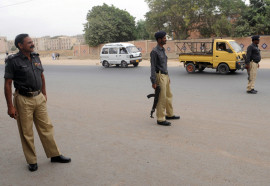
Like millions of other displaced Pakistanis, Sindh’s flood survivors too woke up hungry on Thursday, the first day of Ramazan.
Khatoon fled her village of Karampur to Sukkur, 75 kilometres away after the floods hit.
According to UN officials, more than six million people are now depending on humanitarian aid for survival.
“We have nothing to eat, nothing to live in. We’ve been starving for days, so the start of Ramazan doesn’t bring any joy,” Khatoon sighed. “We used to celebrate Ramazan in a big way in our village, but my children and I are already starving. We need food, so we’re already fasting in a way.”
As fresh flood warnings echo across Pakistan, people who saw their homes, fields and livelihoods get swallowed in the raging brown waters of the Indus, have a long hard journey ahead. Rehabilitation will take months and millions of rupees.
Fifty-five year old Mohammad Parial is also living without proper shelter alogn the highway near Sukkur. “Our village drowned. Our homes and crops are ruined by floods. We are fighting a war of survival,” he said.
More than himself, Parial is worried about his grandchildren, who need urgent food assistance. “It will be a great day when our children get food,” he said.
Parial recalled his life before the flood, “I used to grow fruit and vegetables on my farm in Khanpur but now nobody is offering any help. Ramazan is a month of blessing, but no one is there to let us enjoy these blessings,” he said with tears in his eyes. “All my memories seem to have been swept away by floods.”
Authorities promised to provide cooked meals to flood survivors during Ramazan and compensate families of those killed in the floods but few on the ground expect much assistance.
Mohammad Jadam, 30, a labourer from Thul town, 120 kilometres north of Sukkur, said that people felt betrayed by the government because it had not reached out them when they needed help most.
“I never dreamt I’d be in such circumstances in the holy month. I fast for Allah during Ramazan but we’re [already] starving,” Jadam said, “The government is doing nothing to save our children from starvation.”
The 70 families taking refuge in the Degree College Sukkur, which has been converted into a camp for flood survivors, too had a sad start to the month.
They were given their dinner late so the meal could pass off for both dinner and sehri. The daal and roti was served to them around midnight and they were told to make do with it for sehri as well.
“If there is any food then it is so scarce that we can either eat it ourselves or give it to our children,” said one of the survivors. “Or we can fast.”
Despite limited food, many of the people went ahead with their fast, several of them having just water at sehri.
“We came here with some hope but the situation is so bad,” said another survivor at the camp, “We thought that at least in Ramazan we would be given sehri and iftari.”
However, after a whole food and drink-less day, the families had nothing but plain naan to break their fast with.
People at the camps do not see their situation improving any time soon. Children too are looking morose about their future.
For them, the excitement of Eidul Fitr, at the end of the month, has been quelled before it could surge.
“We never celebrated with much joy because we’re poor and can’t afford expensive food but at least we had food, shelter and water during Ramazan in the past,” said 12-year-old Taj Mohammad.
“My father would bring us new clothes and shoes at Eid but not now,” the boy lamented, “We left all of our belongings behind when our village was flooded. It’s difficult to survive, let alone celebrate.”
With little chance for labour and income, the internally displaced persons at these camps are facing a bleak month ahead.
“We’re hungry and thirsty,” said Taj, “My father and I tried to pick up labour in Sukkur but there are thousands like us on the streets hoping to earn something.”
Problems are many with poor electricity, water and medical arrangements. Even medical facilities that had been available earlier are now nowhere to be found.
Officials at the camp said that there are just not enough resources. “We are trying to do the best we can,” they said, adding that whatever goods they had they were distributing them to the survivors.
Meanwhile, nearly 1,000 more flood affected people have gathered at the Sukkur Bypass. Coming from areas including Shikarpur, Thul, Karampur and Ghauspur, these people have nowhere to go and are simply waiting near the bypass for help.
AFP/with additional input from Shahzad Tabani
Published in The Express Tribune, August 13th, 2010.




1716998435-0/Ryan-Reynolds-Hugh-Jackman-(3)1716998435-0-165x106.webp)










1730706072-0/Copy-of-Untitled-(2)1730706072-0-270x192.webp)
COMMENTS (1)
Comments are moderated and generally will be posted if they are on-topic and not abusive.
For more information, please see our Comments FAQ